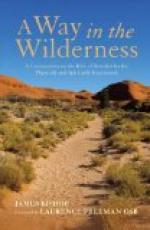It is this great tangle of paths, by the way, which makes a deer or a moose yard; and not the stupid hole in the snow which is pictured in the geographies and most natural history books.
But Megaleep the Wanderer makes no such provision he depends upon Mother Nature to take care of him. In summer he is brown, like the great tree trunks among which he moves unseen. Then the frog of his foot expands and grows spongy, so that he can cling to the mountain-side like a goat, or move silently over the dead leaves. In winter he becomes a soft gray, the better to fade into a snowstorm, or to stand concealed in plain sight on the edges of the gray, desolate barrens that he loves. Then the frog of his foot arches up out of the way; the edges of his hoof grow sharp and shell-like, so that he can travel over glare ice without slipping, and cut the crust to dig down for the moss upon which he feeds. The hoofs, moreover, are very large and deeply cleft, so as to spread widely when his weight is on them. When you first find his track in the snow, you rub your eyes, thinking that a huge ox must have passed that way. The dew-claws are also large, and the ankle joint so flexible that it lets them down upon the snow. So Megaleep has a kind of natural snowshoe with which he moves easily over the crust, and, except in very deep, soft snows, wanders at will, while other deer are prisoners in their yards. It is the snapping of these loose hoofs and ankle joints that makes the merry clacking sound as caribou run.
Sometimes, however, they overestimate their abilities, and their wandering disposition brings them into trouble. Once I found a herd of seven up to their backs in soft snow, and tired out,—a strange condition for a caribou to be in. They were taking the affair philosophically, resting till they should gather strength to flounder to some spruce tops where moss was plenty. When I approached gently on snowshoes (I had been hunting them diligently the week before to kill them; but this put a different face on the matter) they gave a bound or two, then settled deep in the snow, and turned their heads and said with their great soft eyes: “You have hunted us. Here we are, at your mercy.”
They were very much frightened at first; then I thought they grew a bit curious, as I sat down peaceably in the snow to watch them. One—a doe, more exhausted than the others, and famished—even nibbled a bit of moss that I pushed near her with a stick. I had picked it with gloves, so that the smell of my hand was not on it. After an hour or so, if I moved softly, they let me approach quite up to them without shaking their antlers or renewing their desperate attempts to flounder away. But I did not touch them. That is a degradation which no wild creature will permit when he is free; and I would not take advantage of their helplessness.
Did they starve in the snow? you ask. Oh, no! I went to the place next day and found that they had gained the spruce tops, ploughing through the snow in great bounds, following the track of the strongest, which went ahead to break the way. There they fed and rested, then went to some dense thickets where they passed the night. In a day or two the snow settled and hardened, and they took to their wandering again.




